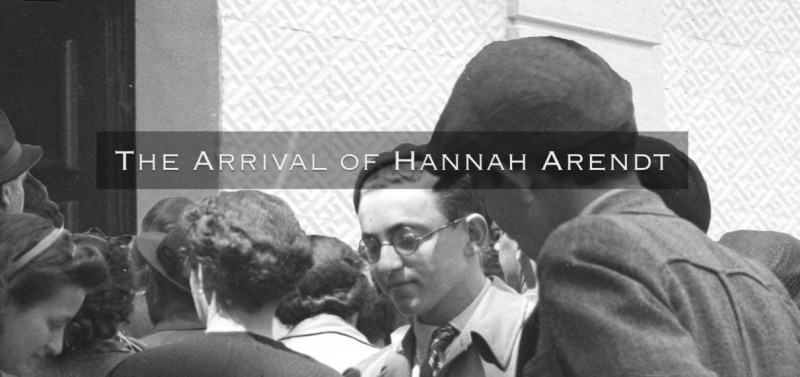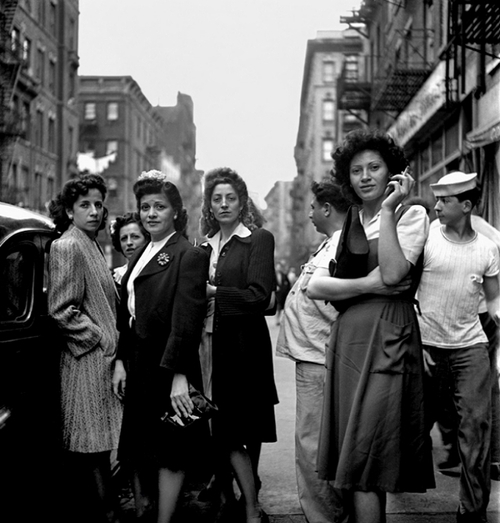
The Arrival of Hannah Arendt
This film describes the arrival of Hannah Arendt - a Jewish, German-American political theorist and publicist - in New York and her reflections on flight and helping people start over.

New York ist schließlich heute noch die Stadt mit der größten jüdischen Bevölkerung der Welt, mit allen Arten von Juden.
[…] Und wie die Spitze von Manhattan aufgestiegen ist aus dem Wasser, ich glaube, es war Nachmittag, war ich ungeheuer bewegt und beeindruckt, natürlich. Am Anfang wurde ich erst mal untergebracht von der HIAS, der jüdischen Emigrantenhilfsorganisation. Hebrew Sheltering and Immigrant Aid Society of America. Die gibts auf der ganzen Welt, heute noch. Ich war einer von den Zweitausend, die hier in einer außerordentlichen Aktion hereingebracht wurden, ohne Quote. Eine Aktion, und a muss ich dem Lande ewig dankbar sein, die von Mrs. Roosvelt initiiert wurde, um wenigstens die, wie sagt man das, die creme of the crop, die intellektuelle Oberschicht, die in Gefahr war, zu retten. Und ich bin dank meinem Freund Graf auf diese Liste gesetzt geworden. Daher steht in manchen Büchern über die Zeit komischerweise, dass unter anderem Marc Chagall, Thomas Mann und George Asher gerettet wurden, steht wirklich da, obwohl ich mich keinesfalls als Gleicher fühle, nicht zugehörig. Zweitausend Leute, eine spezielle Aktion also. Und ich war unvermuteter- und unverdienterweise einer der Zweitausend…
Übrigens, die amerikanischen Juden, die sehr geholfen haben, wenn man hier war, nicht vorher, doch auch, haben sich beklagt: warum gehen die deutschen Juden alle nach Washington Heights, was nachher den Namen „das Vierte Reich“ erhalten hat. Warum? Weil ein deutscher Jude so ist wie ein Deutscher: das erste ist eine anständige Wohnung. Ich habe mich entschlossen, wenn ich schon in Amerika bin, dann will ich in New York sein. Wenn ich in New York bin, will ich in Manhattan sein. Und ich bin dann hier nach Manhattan 85. Straße übersiedelt. […]
Ich habe also Arbeit gesucht. lange konnte ich von den achtzig Dollar Startgeld nicht leben. Wenn ich mich genau erinnere, der erste Job, den ich bekommen habe, war in einem Coffeeshop. Es war sehr schön und gut, und ich hab also Englisch verstanden, aber ich konnte natürlich nicht die Fachausdrücke, die bei einem solchen Beruf notwendig sind. Wenn also jemand, speziell zur Lunchzeit, wenn man seine Sekunde Zeit hat, gerufen hat „draw one“, hab ich nicht gewusst, dass heißt Kaffee. […]
Und ich habe viele der Emigranten, die politisch tätig waren, angesehen, wie man seinerzeit die russischen Emigranten ansah, die in den Caféhäusern in Paris sitzen und warten, bis die Bolschewiken gestürzt werden. Und noch immer drauf warten. Ich wollte keiner von denen sein. Man wußte nicht, wie lange der Krieg dauert. Man wußte nicht, werden wir jemals zurückgehen? Ich war wohl so eingestellt, wie Thomas Wolfe sagt, „you can’t go home again“. Daß es eigentlich kein Zurück gibt.
Wie waren denn die anderen Emigranten?
Man muss unterscheiden. Da waren die jüdischen Emigranten, die einfach vertrieben und geflüchtet sind, rausgeworfen aus ihrem Dasein. Ihr einziges Interesse war, sich zu etablieren. Einen Job zu haben, einen Beruf zu haben, eine Frau zu heiraten, irgendwie zu leben. Die aber doch wie jede Emigration in diesem Land in ihrem Zirkel leben. Hier haben sich die jüdischen Emigranten damals oben in Washington Heights angesiedelt. Viele Amerikaner haben das übelgenommen. Die deutschen Juden waren ja wie die anderen Deutschen, die müssen eben erst eine anständige Wohnung haben. Und womöglich anständig angezogen sein. Das Essen spielt nicht so eine Rolle. Und die Gegend war neu. Und damals gab es keine Wohnungsnot in Amerika. Es war Sitte damals, dass die Leute jedes Jahr im Oktober umgezogen sind, man konnte für ein Nichts Möbel kriegen. Man konnte sie auf der Straße aufklauben, die Leute haben die Möbel weggeworfen, wenn sie umgezogen sind. Man konnte sie anständig einrichten.
Die andere Gruppe, der ich natürlich viel mehr zugeneigt war, das waren die Politischen. Wovon es aber nicht sehr viele gab. Das waren doch alles Linke. Es gab auch Rechte. Aber ich habe es abgelehnt, Emigrantenpolitik zu machen. […]
Es gab ein Lokal in der Village, wo die Valeska Gert ein Cabaret gehabt hat, wo man zusammengekommen ist. Gewisse Freunde haben sozusagen open house einmal in der Woche gehabt, da es doch hier keine Caféhäuser gab. Es gab ja nur auf der 72. Strasse das „Eclair“. Das war ein Caféhaus, wo damals schon meistens solide werdende deutsch-jüdische Bürger zusammengekommen sind. Und meine freund Oskar Maria Graf hat gerne einen Kreis um sich versammelt, wo er seine Bücher vorlesen konnte. Daraus ist eine Diskussion geworden. Und man ist abwechselnd in den verschiedenen Wohnungen so ein-bis zweimal im Monat zusammengekommen, und er hat vorgelesen aus dem, was er so gerade geschrieben hat. Das wurde dann diskutiert. Waren vielleicht fünfzehn, zwanzig Leute da. […]
Und so haben wir ein Lokal gefunden, die „Blaue Donau“ und haben Freunde eingeladen. Daraus ist ein Stammtisch geworden, der bis heute und alle die Jahre hindurch besteht und durch den viele, viele Menschen gegangen sind: Gewöhnliche, Ungewöhnliche, Bedeutende, Wichtige, Schriftsteller, Ganzdurchschnittsmenschen, Jüngere, Ältere, Leute wie Brecht, Verleger, Zuckmayer und die Frau vom…weiß der Deibel, alle möglichen. Ich kann gar nicht mehr alle aufzählen.

New York, after all, is still today the city with the largest Jewish population in the world, with all kinds of Jews.
[…] And when the tip of Manhattan rose out of the water, I think it was afternoon, I was tremendously moved and impressed, of course. At first I was housed by HIAS, the Jewish Emigrant Aid Society. Hebrew Sheltering and Immigrant Aid Society of America. They exist all over the world, even today. I was one of the two thousand who were brought in here in an extraordinary action, without quota. An action, and a I must be eternally grateful to the country, which was initiated by Mrs. Roosvelt to save at least the, how do you say it, the creme of the crop, the intellectual upper class, which was in danger. And I got on that list thanks to my friend Graf.Therefore, in some books about the time, strangely enough, it says that Marc Chagall, Thomas Mann and George Asher, among others, were saved, is really there, although I do not feel at all like an equal, not belonging. Two thousand people, a special action, then. And I was, unexpectedly and undeservedly, one of the two thousand…
By the way, the American Jews, who helped a lot when you were here, not before, but also, complained: why do the German Jews all go to Washington Heights, which afterwards got the name “the Fourth Reich”. Why? Because a German Jew is like a German: the first thing is a decent apartment. I decided that if I’m going to be in America, I want to be in New York. If I’m in New York, I want to be in Manhattan. And I moved here to Manhattan 85th Street. […]
So I looked for work. For a long time I couldn’t live on the eighty dollars starting money. If I remember correctly, the first job I got was in a coffee shop. It was very nice and good, and so I understood English, but of course I didn’t know the technical terms that are necessary in a job like that. So when somebody, especially at lunch time, when you have your second, called out “draw one,” I didn’t know that meant coffee. […]
And I looked at many of the emigrants who were politically active, as one looked at the Russian emigrants at the time, sitting in the cafés in Paris, waiting for the Bolsheviks to be overthrown. And still waiting for it. I didn’t want to be one of them. One didn’t know how long the war would last. One didn’t know, will we ever go back? I guess my attitude was, as Thomas Wolfe says, “you can’t go home again.” That there’s really no going back.
What were the other emigrants like?
You must distinguish. There were the Jewish emigrants who were simply expelled and fled, thrown out of their existence. Their only interest was to establish themselves. To have a job, to have a profession, to marry a woman, to live somehow. But like every emigration in this country, they live in their circle.This is where the Jewish emigrants settled back then up in Washington Heights. Many Americans resented this. The German Jews were like the other Germans, they had to have a decent apartment first. And possibly be decently dressed. The food didn’t play such a role. And the neighborhood was new. And there was no housing shortage in America at that time. It was a custom in those days that people moved every year in October, you could get furniture for nothing. You could pick it up on the street, people threw the furniture away when they moved. You could furnish them decently.
The other group, to which I was naturally much more inclined, were the political ones. But there weren’t very many of them. They were all leftists. There were also right-wingers. But I refused to do emigrant politics. […]
There was a restaurant in the Village where Valeska Gert had a cabaret, where people got together. Certain friends had an open house once a week, so to speak, since there were no cafés here. There was only the “Eclair” on 72nd Street. That was a café house, where at that time already mostly solidly becoming German-Jewish citizens met. And my friend Oskar Maria Graf liked to gather a circle around him where he could read his books aloud. This turned into a discussion. And they took turns meeting in the various apartments once or twice a month, and he read aloud from what he had just written. That was then discussed. There were maybe fifteen or twenty people there. […]
And so we found a place, the “Blue Danube” and invited friends. This became a regulars’ table, which still exists today and throughout the years, and through which many, many people have passed: ordinary, unusual, important, writers, average people, younger, older, people like Brecht, publishers, Zuckmayer and the wife of…who knows, all kinds. I can’t even list them all anymore.
Harry Asher – originally Georg Auscher – born in Vienna in 1907. The father is a general agent of a textile printing company. In 1920 the family moves to Czechoslovakia, where his parents come from. At the end of the 1920s Harry Asher became a member of the Communist Party, from which he separated again under the impression of the Moscow Trials. In 1939 he witnessed the invasion of German troops in Prague, was able to flee to Paris and was interned at the beginning of the war. In the spring of 1941 he received an affidavit for the United States and reached New York in Easter 1941. He lived on 72nd Street West in Manhattan. In his conversation with the author of the book “Die verheißene Stadt” Thomas Hartwig, Harry presents his first experiences, difficulties and encounters with other emigrants in New York.
Thomas Hartwig, Achim Roscher, 1986: Verheißene Stadt: Deutsch-jüdische Emigranten in New York. Gespräche, Eindrücke und Bilder. Berlin: Das Arsenal. pp.36, 41-42, 44-46.
Translation from German to English © Minor Kontor / We Refugees Archive.